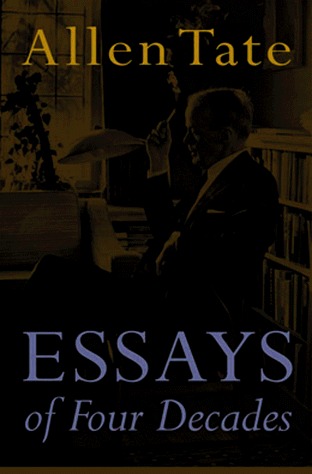There are historical reasons—historical in more than one sense—why we should be glad to see this work back in print. Since I can so well remember owning the editions of 1959 and 1968 and absorbing their contents, the thought that these essays will reach new readers in the new millennium is a pleasant one. And that in itself is remarkable in our new age.
The first historical reason that comes to mind is that these essays, written from the early 30’s to the late 60’s, are a record of the intellectual progress of one of the most remarkable writers and personalities in the story of American literature. As a member of the Fugitives, a leader of the Nashville Agrarians, a distinguished poet and even a novelist, as a professor and man of letters, Allen Tate made his mark in the unfolding of the New Criticism. These essays record, among other things, the establishment of a “weak modernist” view of literature that has been the most influential way of reading and teaching literature in the last century. This means that the next historical reason for reading the essays is to absorb their hedged ahistoricism. In “Miss Emily and the Bibliographers,” the critic concludes (as he dismisses the sterility of bibliography and “the historical method”), “[T]he literature of the past lives in the literature of the present and nowhere else; that it is all present literature.” Yes, but we have noted that this view, a radical one, is qualified.
And this brings us to a contradiction, I hope—namely that these essays are also valuable, or ever more invaluable, for their historical consciousness—I did not say “historical method.” Or perhaps I should say that the historical consciousness is a philosophical one, or even a remarkable sophistication:
I have wished only to observe that before the Christian dispensation, and well into it, the professors of special knowledge tried to be responsible for the public use of their techniques. We have not, so far as I know, a record of any of their reasons for what we should consider an illiberal suppression of the truth. But if we think of the Greek world of thought as having lasted about nine hundred years, down to the great pupils of Plotinus—Jamblichus and Porphyrins—we may see in it a sense of the whole of life that must not be too quickly disturbed for the procreation of special scientific interests.
I would call such a perspective indispensable, if I did not know that in fact it has been dispensed with by the educational system of this country. Therefore, we must today read Tate’s 50 pieces as they have not been read before —not so much as instruction as a record of losses. He had already implied as much when he insisted on the necessity of cultural perspective, concluding his “Understanding Modern Poetry” as follows;
[M]odern poetry is difficult because we have lost the art of reading any poetry at all that will not read itself to us; that thus our trouble is a fundamental problem of education, which may be more fundamental than education. We may be approaching the time when we shall no longer be able to read anything and shall be subject to passive conditioning. Until this shall happen, however, we might possibly begin to look upon language as a field of study, not as an impressionistic debauch. If we wish to understand anything, there is only the hard way; if we wish to understand Donne and Eliot, perhaps we had better begin, young, to read the classical languages, and a little later the philosophies. There is probably no other way.
So yes, the literary interest is paramount in these essays, and there is little need to cite the titles and subjects and various treatments of poetic and functional topics. The word “tension” must remind us of a certain examination of poetry, and the names of Emily Dickinson, Edgar Allan Poe, John Donne, Hart Crane, and even Longinus must remind us of Tate’s essays about them. Then, of course, there is the matter of Tate’s essays on the South, which everyone knows and quotes and attempts to refute. These are indispensable as w ell, and like the literary essays, they not only instruct us but force us to consider the kind of man it was who had such knowledge carried to his heart.
But beyond such necessary works are other treatments of topics that I will call political and even religio-philosophical. Two of the best essays were presented at the International Exposition of the Arts (under the auspices of the Congress for Cultural Freedom) in Paris in 1951, and I will neglect this context to observe that the Central Intelligence Agency would be more likely to sponsor covertly today a hip-hop poetry slam than any such with rebuttal of vulgarized democracy.
Will it not be borne in upon us in the next few years that Hitler and Stalin are the Common Man, and that one of the tasks of democracy is to allow as many men as possible to make themselves uncommon?
If anything can be better than that, then it must be the essay “The Angelic Imagination,” which shows the falsehood of claiming, or aspiring to, unmediated knowledge of essences. It is the most sophisticated portrayal of modern error and even perversion that I know—and I believe that it accurately prophesied a great deal of contemporary confusion, including Harold Bloom’s latest excursion his gnosticism.
In short, Allen Tate’s essays are necessary, and that’s why they are again available. They ought someday to be published (with other examples of his work) in the Library of America; as a single volume of literary/cultural criticism, the Essays of Four Decades is the finest example of its kind in American literary history.
[Essays of Four Decades, by Allen Tate (Wilmington, DE: ISI Books) 640 pp., $29.95]



Leave a Reply